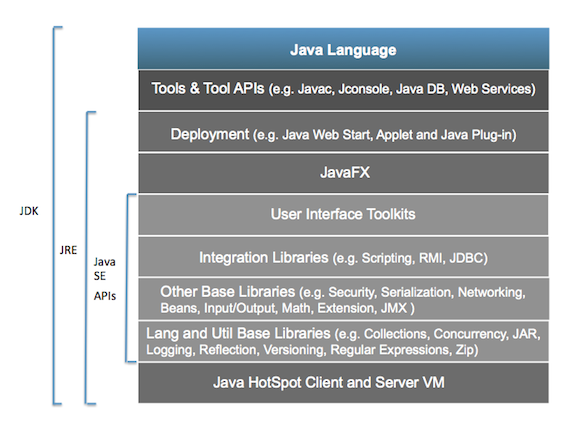Java Platform, Standard Edition (Java SE)
Java SE lets its users develop and deploy Java applications on desktops and servers, as well as embedded environments. Java SE contains the core of the Java programming language libraries.
The components of Java SE are Java Development Kit (JDK), Java Runtime Environment (JRE) and Java SE application programming interface (API). JDK contains the JRE and the compilers and debuggers necessary for developing applets and applications. JRE provides the libraries, the Java Virtual Machine (JVM) and the components needed to run Java applets and applications. (See graphic below)
Java SE Conceptual Diagram

Learn Java SE
Review essential Java concepts like concurrency, expressions, collections, arrays, generics and more with the Java Tutorials. They cover all those advanced concepts with detailed explanations and code examples. Complete the short exams to test your knowledge along the way. A Java Glossary is also available with a list of definitions.
**
Learn about Java Reflection**
https://www.youtube.com/watch?v=1xs8AO-lT6E
Create a Java application in NetBeans with this step-by-step tutorial. It also explains the NetBeans development tool and techniques. Learn how to build real-world business applications with the Java SE hands-on workshop. It offers detailed lab instructions and exercises as well as a comprehensive overview of Java SE
JavaOne presentations offers Java development learning content from the week-long Java conference. It has a mix of tutorials and conference sessions, representing hours of great learning content for free. Learn about the new Java SE features. Check out the freely available recorded conference sessions.
Oracle offers developer events around the world. Check the upcoming events calendar to attend an event in your area. Attend the Virtual Technology Summit, a live event available for different time zones. Check out the next Virtual Technology Summit or watch the replays.
A number of lessons are available to prepare beginners for three Java certifications. With explicit explanations and examples, these lessons cover basic and advanced Java subjects as well as the latest features in Java 8 and are a good way of testing your Java knowledge.
Recommended Readings:
OCA: Oracle Certified Associate Java SE 8 Programmer | Study Guide: Exam 1Z1-808
OCA/OCP Java SE 7 Programmer I & II Study Guide by Kathy Sierra and Bert Bates
The Complete Reference, 9th Edition, and Java: A Beginner’s Guide, 6th Edition by Herbert Schildt.
Answer to TEST YOUR KNOWLEDGE: When you're just learning Java, it is often useful to check your understanding of key features as you progress in your studies. To help you do that, we asked Herb Schildt, the author of the bestselling Oracle Press book "Java: The Complete Reference", to provide several questions that test your knowledge of three core topics that all Java programmers must master: data types, variables, and arrays. For detailed information related to these, and the many other features of the Java language, see Herb's comprehensive book, Java:The Complete Reference, 9th edition.
Answer:
Group and Index
Herbert Schildt, whose programming books have sold more than 3.5 million copies worldwide, is the Oracle Press author of a number of Java books, including his most recent Java: The Complete Reference, 9th Edition, and Java: A Beginner’s Guide, 6th Edition.